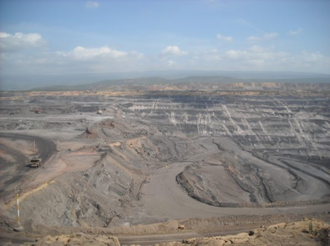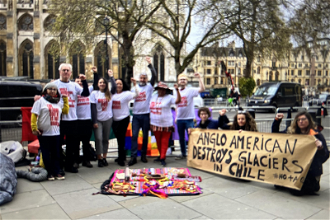Church and Campesinos in Colombia

Cerrejon Mine, Colombia
In August this year, I participated in a human rights delegation to the province of La Guajira in northern Colombia to visit communities affected by a huge open-cast mine. The Cerrejon coal mine is currently owned by three massive mining companies listed on the London Stock Exchange - Anglo American, BHP and Glencore. Its operations since it opened in the early 1980s have led to the forced relocation of numerous rural communities of indigenous Wayuu people and small-scale farmers, or campesinos, mostly of African descent. The local Catholic Church has not proved itself a good friend to those communities.
One of the people who first got me involved, 18 years ago, in the work of solidarity with these communities, was Armando Perez, a Colombian lawyer who was trying to get justice for some of the people facing removal from their land. Knowing that I am Catholic, and indeed saying approving things of the way in which my faith motivates me to pursue the work of solidarity, he is nonetheless extremely critical of the way the local Church has failed to support communities ill-prepared for a struggle imposed on them by powerful outside interests.
The most egregious example, in his view, was the destruction of the village of Tabaco in 2001. The mining company wanted the people out, but many of them were holding out for a decent relocation agreement, under which the whole village would be moved to a new rural site so that the community could remain together and continue their agricultural way of life. The villagers had built their own local church themselves. To pressure them to move, the mining company paid the local diocese to let it demolish the church. The villagers were horrified, but they remained. They felt abandoned by the diocese. Villagers had a deep devotion to St Martin de Porres, a sixteenth century Peruvian of part-African descent, son of a freed slave from Panama. On 9 August of that year, company personnel, accompanied by police and armed security guards, demolished the village and threatened to kill the unarmed villagers if they resisted. Company officials took away the statue of St Martin de Porres, purchased by the villagers themselves, and did not return it. The villagers felt abandoned by their patron saint. Their parish priest did nothing to assist them. They felt abandoned by the Church. Most of them, I am told, have now abandoned Catholicism entirely.
Part of the problem is the contempt in which local elites hold campesinos. This contempt has racist elements, because of the African, indigenous or mixed descent of the local farming population. But it is not only racism: there is a deep contempt for people who make a living from subsistence farming. I remember my first ever visit to the area, in October 2000. My English colleague and I accompanied Armando the lawyer and Jose Julio, a community leader from Tabaco, to the local mayor's office, to seek the mayor's support. His municipal attorney was there, a rather patrician woman or visibly European descent, who told us, in front of Jose Julio, "What you have to realise is that these people are primitive. If they insist on earning a living from agriculture, they should seek waged labour on one of the enormous pineapple plantations we want to put in around here." There was no sympathy, no respect, no understanding of the nobility and independence of the campesino way of life. They were primitive people who needed to be pushed out of the way of progress.
The contempt has got more polite over the years. Officials have realised that the irritating foreigners who come and snoop around the area from time to time actually respect the campesinos and count them among our friends, so they do not say things like that in front of us anymore. But the attitude lurks just beneath the surface. When I visited the mine in June 2014, an employee from the reclamation department proudly showed us the impressive job the team had done in revegetating mined-out areas of the concession. He told us that the problem was going to be keeping the campesinos off the land once the mine closed - if they came back to the lands they used to farm, they would ruin them. Never mind the fact that the campesinos had looked after those lands perfectly well for hundreds of years before the mining company turned up, threw them out and dug enormous coal pits where once were fields and woodland. When I visited the mine again last month, the reclamation department was even more polite. They were now running a project to help the campesinos learn better farming practices. It was entirely voluntary, and mining company officials were encouraging people to get involved by opening up conversations with them in the simple language that people like that understand before moving on to more complicated concepts that might confuse them. As you can imagine, the reclamation department staff explained to us, campesinos can be difficult to teach.
I think I would be difficult to teach if the person teaching me insisted on treating me like an ignorant fool.
It is clear that the campesinos have the papacy on their side. In his 2015 encyclical letter, Laudato Si, Pope Francis quotes approvingly from the Paraguayan Bishops' Conference: 'Every campesino has a natural right to possess a reasonable allotment of land where he can establish his home, work for subsistence of his family and a secure life. This right must be guaranteed so that its exercise is not illusory but real. That means that apart from the ownership of property, rural people must have access to means of technical education, credit, insurance, and markets.' (94)
The Cerrejon mine has forced campesinos off their land and deprived many of them of any possibility of pursuing subsistence agriculture. Since the London-listed companies took over complete control of the mine in early 2002, they have adopted a policy of community negotiation and collective relocation where that is what people want, and that is an improvement on what went before; but instead of moving rural communities to sites where they can live by farming, they have moved them to semi-urban sites where each household is given only one hectare of land, despite the fact that the Colombian government says that in that area each family needs between 73 and 95 hectares if they are to make a living from agriculture. Rather than provide adequate land and provide the kind of assistance endorsed by Pope Francis in Laudato Si, the mine has encouraged villagers to take up other occupations such as running taxi services or selling mobile phones, when they have no experience of such things and there is not enough demand. Many of these new businesses have failed, and people are facing destitution.
So what is the local Church now doing to defend the dignity of the campesinos of La Guajira? As far as I can tell, precious little. But that may be changing. On my most recent visit, I encountered the parish priest at one of the relocated villages. He arrived rather late at a meeting with the local community, and he had to leave before the meeting ended, and I did not have the chance to have a personal conversation. But his words impressed me. He talked of the terrible cost of the forced relocations of communities, how people's dignity had been violated, their identity obliterated by being compelled the leave the particular places which had formed them, full of precious memories. He spoke of the grief of a parishioner who had worked at the mine and had had to dump mine waste on the former site of his own garden. This priest was truly walking with his people, feeling their sorrows and defending their dignity. He kept saying, "Count on me, count on me," and I intend to do just that.
As Christians, as Catholics, we have a duty to defend the human dignity of our campesino brothers and sisters. And as citizens of the UK, we also have a duty to ensure that companies listed on the London Stock Exchange, in which so many working people have shares through their bank accounts and pension funds, do likewise.
Richard is a member of Colombia Solidarity Campaign and Co-ordinator of London Mining Network. He is also a member of St Thomas More Catholic parish in Manor House, North London, and of the Community of the Passion.
Links: http://londonminingnetwork.org/2018/08/fear-and-loathing-in-la-guajira/


















